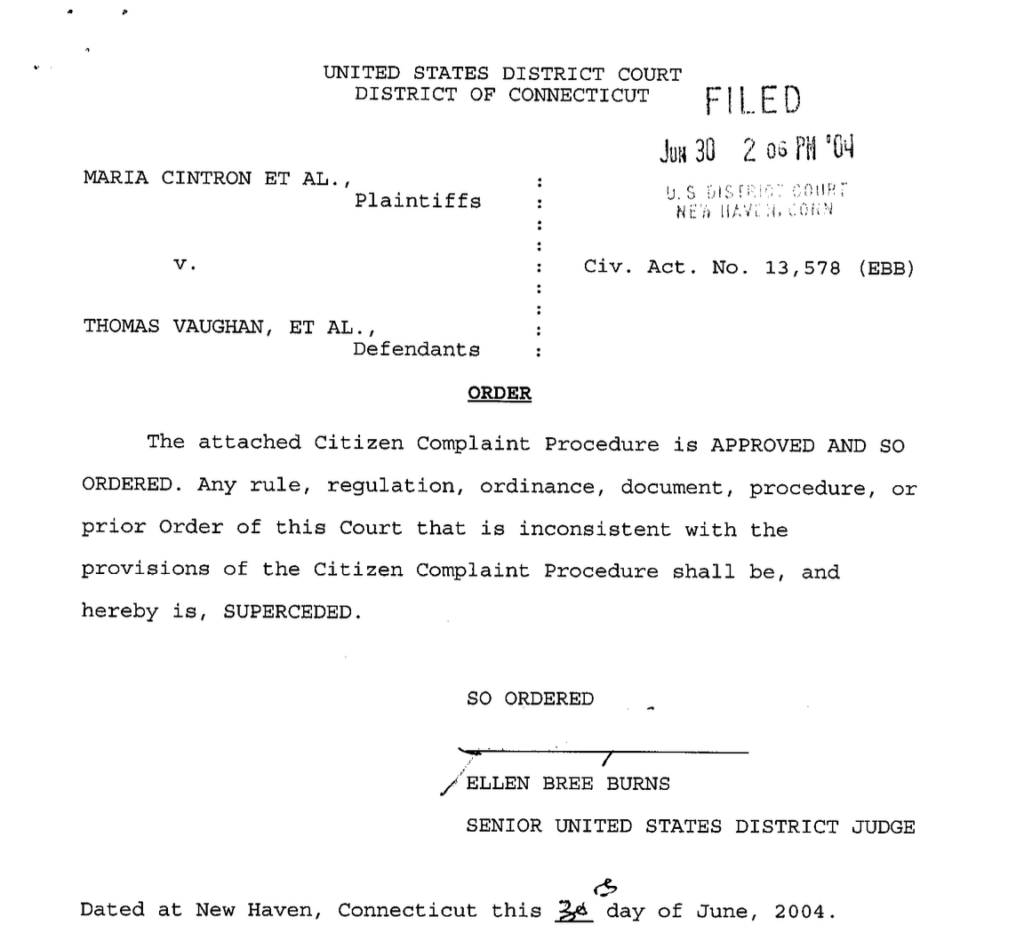The plaintiffs first file a motion for contempt relating to Officer Murtha’s shooting of Elvin Gonzalez and the subsequent obstruction of the investigation.89 The defendants push for an end to the Special Master’s tenure, so Bieder offers to work pro bono and is reappointed for a second term.90
Separately from the ongoing motion for contempt, the parties sign the aforementioned “2004 Order.”91 The civilian complaint process already in place was essentially meaningless, as described by Civilian Review Board member Ross Jones: “In every single citizen complaint I have reviewed, I have found that the Internal Affairs Division’s findings supported, validated and corroborated the version of the story reported by the accused police officer.”92 The Hartford Advocate reported in 2003 that the HPD officers faced seventy-three excessive force complaints from 1999 through 2001, and none were sustained by internal affairs.93 In addition to its lack of efficacy, Internal Affairs had a significant backlog of complaints which had gone uninvestigated (as the Buracker report revealed back in 1999), so the 2004 Order instructs the department to maintain double staff for two years in order to clear it. The 2004 Order also allows for several “community-based organizations” (CBOs) including la Casa de Puerto Rico, the NAACP, and ONE-CHANE to function as alternative venues for complaint receipt. This is the same role that the Citizen Complaint Center unofficially served in the early 70s (See entry under the Guardians). The CBOs are to be provided training from the city’s Office of Human Relations and are instructed to send complaints onto the HPD internal affairs division immediately. Additionally, the order instructs the city to fund a “computerized investigative program” for complaint filing within thirty days of its signing.94 Each complaint received by internal affairs will be transmitted to the Civilian Review Board within three days, and each complaint investigation will be completed within thirty days. Finally, the order instructs Internal Affairs to send two reports a year tracking complaints to the Chief, Mayor, Civilian Review Board, and the Cintron Negotiating Committee.
By November, the plaintiffs come to realize that the HPD is not following the new complaint procedure. They try to resolve the issues with defendants directly but are not able to, so they file a motion for contempt.95 Of the requirements recounted above, the department did not implement a computerized program for tracking complaints, failed to provide training to community-based organizations in complaint processing, and did not appoint eight investigators to Internal Affairs to clear their backlog.96
Notes
89. Motion for Contempt, Cintron, et al v. Vaughn, et al, 3:69-cv-13578-KAD (D. Conn. March 14, 2004).
90. Order, Cintron, et al v. Vaughn, et al, 3:69-cv-13578-KAD (D. Conn. October 13, 2004).
91. Order, Cintron, et al v. Vaughn, et al, 3:69-cv-13578-KAD (D. Conn. June 30, 2004).
92. Ross Jones, Statement about the Civilian Police Review Board, Private Collection of Attorney Sydney Schulman
93. Dan Levine, “Hartford Cops. A Brutal Pattern” Hartford Advocate, October 16, 2003.
94. Order at 1, Cintron, et al v. Vaughn, et al, 3:69-cv-13578-KAD (D. Conn. June 30, 2004).
95. Findings of Fact and Recommendations at 20-21, Cintron, et al v. Vaughn, et al, 3:69-cv-13578-KAD (D. Conn.
July 2, 2007).
96. Motion for Contempt, Cintron, et al v. Vaughn, et al, 3:69-cv-13578-KAD (D. Conn. March 15, 2005).

